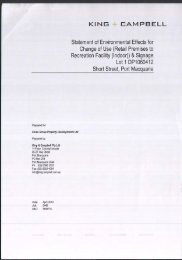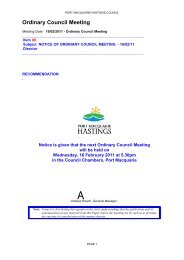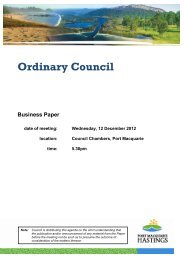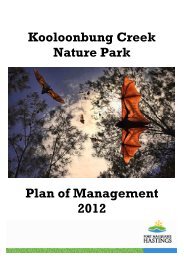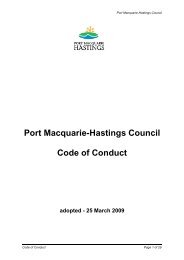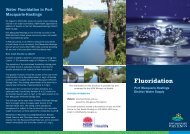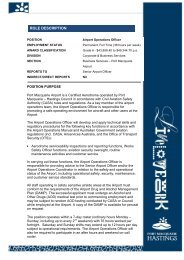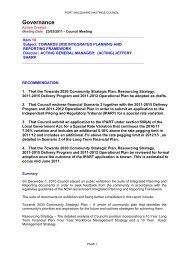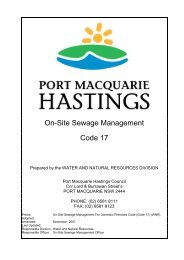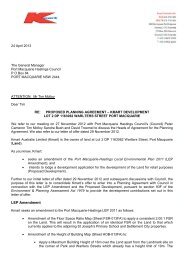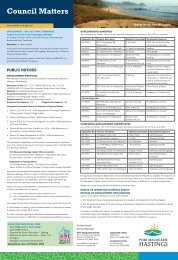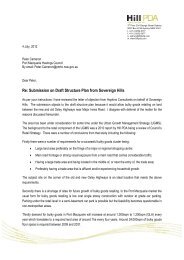20 February 2013 - Hastings Council
20 February 2013 - Hastings Council
20 February 2013 - Hastings Council
Create successful ePaper yourself
Turn your PDF publications into a flip-book with our unique Google optimized e-Paper software.
Ordinary <strong>Council</strong><br />
LATE REPORTS<br />
Business Paper<br />
date of meeting: Wednesday, <strong>20</strong> <strong>February</strong> <strong>20</strong>13<br />
location:<br />
time:<br />
<strong>Council</strong> Chambers, Port Macquarie<br />
5.30pm<br />
Note:<br />
<strong>Council</strong> is distributing this agenda on the strict understanding that<br />
the publication and/or announcement of any material from the Paper<br />
before the meeting not be such as to presume the outcome of<br />
consideration of the matters thereon.
<strong>Council</strong>’s Vision<br />
A sustainable high quality of life for all.<br />
<strong>Council</strong>’s Mission<br />
To provide regional leadership and meet the<br />
community’s needs in an equitable and<br />
inclusive way that enhances the area’s<br />
environmental, social and economic<br />
qualities.<br />
<strong>Council</strong>’s Corporate Values<br />
Sustainability<br />
Excellence in Service Delivery<br />
Consultation and Communication<br />
Openness and Accountability<br />
Community Advocacy<br />
<strong>Council</strong>’s Guiding Principles<br />
Ensuring Good Governance<br />
Looking after our people<br />
Helping our community prosper<br />
Looking after our environment<br />
Planning & providing our infrastructure
How Members of the Public Can Have Their Say at <strong>Council</strong> Meetings<br />
<strong>Council</strong> has a commitment to providing members of the public with an input into <strong>Council</strong>'s<br />
decision making. The <strong>Council</strong>'s Code of Meeting Practice provides two (2) avenues for<br />
members of the public to address <strong>Council</strong> on issues of interest or concern at the Ordinary<br />
<strong>Council</strong> Meeting. These are:<br />
Addressing <strong>Council</strong> on an Agenda Item:<br />
If the matter is listed in the <strong>Council</strong> Business Paper, you can request to address <strong>Council</strong> by:<br />
Completing the Request to Speak on an Agenda Item at a <strong>Council</strong> Meeting”, which can be<br />
obtained from <strong>Council</strong>’s Offices at Laurieton, Port Macquarie and Wauchope or by<br />
downloading it from <strong>Council</strong>’s website.<br />
Telephoning your request through to <strong>Council</strong>’s Call Centre on (02) 6581 8111.<br />
On-line at<br />
http://www.hastings.nsw.gov.au/www/html/2924-addressing-a-council-meeting-in-relationto-an-agenda-item.asp?intSiteID=1<br />
Your request to address <strong>Council</strong> must be received by <strong>Council</strong> no later than 4:30pm on<br />
the day prior to the <strong>Council</strong> Meeting.<br />
<strong>Council</strong>'s Code of Meeting Practice sets out the following guidelines for addressing <strong>Council</strong>:<br />
Addresses will be limited to 5 minutes.<br />
If you wish any written information, drawings or photos to be distributed to the <strong>Council</strong> to<br />
support the address, two (2) copies should be provided to the Manager Executive Services<br />
(Governance) prior to the commencement of the meeting.<br />
Where speakers wish to make an audio visual presentation, a copy is to be provided to the<br />
Manager Executive Services (Governance) by 12 noon on the day of the <strong>Council</strong> Meeting.<br />
<strong>Council</strong> will permit only two (2) speakers "Supporting" and two (2) speakers "Opposing"<br />
the Recommendation contained in the Business Paper. If there are more than two<br />
speakers supporting and opposing, the Mayor will request the speakers to determine who<br />
will address <strong>Council</strong>.<br />
Addressing <strong>Council</strong> in the Public Forum:<br />
If the matter is not listed in the <strong>Council</strong> Business Paper, you can request to address <strong>Council</strong><br />
by:<br />
Completing the Request to Speak in the Public Forum at Ordinary <strong>Council</strong> Meeting”, which<br />
can be obtained from <strong>Council</strong>’s Offices at Laurieton, Port Macquarie and Wauchope or by<br />
downloading it from <strong>Council</strong>’s website.<br />
Telephoning your request through to <strong>Council</strong>’s Call Centre on (02) 6581 8111.<br />
On-line at<br />
http://www.hastings.nsw.gov.au/www/html/2926-addressing-council-in-the-councilmeeting-public-forum.asp?intSiteID=1<br />
Your request to address <strong>Council</strong> must be received by <strong>Council</strong> no later than 4:30pm on<br />
the day prior to the <strong>Council</strong> Meeting.<br />
A maximum of eight (8) speakers will be heard in the Public Forum. Each speaker will be<br />
limited to 5 minutes. <strong>Council</strong> may ask questions of speakers but speakers cannot ask<br />
questions of <strong>Council</strong>.<br />
<strong>Council</strong> will not determine matters raised in the Public Forum session, however may resolve<br />
to call for a further report, when appropriate.<br />
Speakers will be allowed to address <strong>Council</strong> in the Public Forum on the same issue no more<br />
than three (3) times in each calendar year. (Representatives of incorporated community<br />
groups may be exempted from this restriction).
Ordinary <strong>Council</strong> Meeting<br />
Wednesday, <strong>20</strong> <strong>February</strong> <strong>20</strong>13<br />
LATE REPORTS<br />
Items of Business<br />
Item Subject Page<br />
Helping Our Community Prosper .......................................................................................... 5<br />
10.04 Establishment of an Economic Development Consultative<br />
Group ......................................................................................................... 6
LATE REPORTS<br />
Helping Our Community Prosper<br />
ORDINARY COUNCIL<br />
<strong>20</strong>/02/<strong>20</strong>13<br />
What are we trying to achieve?<br />
The Port Macquarie-<strong>Hastings</strong> region is able to thrive through access to a range of<br />
educational, employment and business opportunities.<br />
What will the result be?<br />
<br />
<br />
Greater availability of educational opportunities.<br />
Key business sectors are able to benefit from our natural and existing<br />
attributes.<br />
<br />
Business and industry, training and education facilities sustain our population<br />
growth.<br />
<br />
<br />
<br />
Increased employment opportunities.<br />
An environmentally harmonious and prosperous tourism industry.<br />
Widely available communications technology.<br />
How do we get there?<br />
3.1 Create opportunities for lie long learning and skill enhancement with the<br />
availability of a broad range of education and training facilities.<br />
3.2 Promote and support an increase in business capacity in order to generate<br />
ongoing economic growth.<br />
3.3 Expand tourism business opportunities and benefits through collaborative<br />
planning and promotion.<br />
3.4 Maximise innovation and economic competitiveness by providing high quality<br />
communication technology throughout the Port Macquarie-<strong>Hastings</strong> region.<br />
3.5 Target and encourage business enterprise by providing favourable business<br />
conditions including infrastructure and transport options.<br />
Page 5
LATE REPORTS<br />
Helping Our Community Prosper<br />
ORDINARY COUNCIL<br />
<strong>20</strong>/02/<strong>20</strong>13<br />
Item: 10.04<br />
Subject:<br />
ESTABLISHMENT OF AN ECONOMIC DEVELOPMENT<br />
CONSULTATIVE GROUP<br />
Presented by: Corporate & Business Services, Craig Swift-McNair<br />
Alignment with Delivery Program<br />
3.2.1 Implement and evaluate support programs that assist the growth of existing<br />
business.<br />
RECOMMENDATION<br />
That <strong>Council</strong>:<br />
1. Note the information contained in the report that details the key findings<br />
of the independent economic development and tourism review;<br />
2. Support the establishment of an Economic Development Consultative<br />
Group (EDCG) to facilitate a strong partnership between <strong>Council</strong> and<br />
local business and industry sectors throughout the local government<br />
area;<br />
3. Appoint three (3) <strong>Council</strong>lors to the Economic Development Consultative<br />
Group (EDCG) for the period from commencement of the EDCG for a<br />
period of twenty four (24) months.<br />
Executive Summary<br />
This report details information relating to the establishment of an Economic<br />
Development Consultative Group (EDCG), following the findings of a recent<br />
independent economic development and tourism review. The EDCG will assist<br />
<strong>Council</strong> in developing an economic development strategy that will guide economic<br />
development opportunities for the period <strong>20</strong>13-<strong>20</strong>16.<br />
Discussion<br />
Review Process<br />
Between April <strong>20</strong>12 and November <strong>20</strong>12, <strong>Council</strong> undertook an independent review<br />
of economic development and tourism services as provided by <strong>Council</strong>.<br />
The review involved consultation with a wide range of stakeholders and was tasked<br />
with reviewing service delivery options for economic development and tourism<br />
services, plus a review of economic development and tourism programs. The next<br />
stage of this review process is for the development of an economic development and<br />
industry engagement plan that will progress local and regionally significant economic<br />
outcomes that continue to grow the economy in the local government area.<br />
Item 10.04<br />
Page 6
LATE REPORTS<br />
Helping Our Community Prosper<br />
ORDINARY COUNCIL<br />
<strong>20</strong>/02/<strong>20</strong>13<br />
<strong>Council</strong> acknowledges the important leadership role it plays in economic<br />
development within the local government area and the wider region and this is<br />
reflected by the community as detailed in the Port Macquarie-<strong>Hastings</strong> <strong>Council</strong><br />
‘Towards <strong>20</strong>30 Community Strategic Plan’ (CSP). The CSP includes the following<br />
information under Focus Area 3 - Helping Our Community Prosper:<br />
What are we trying to achieve?<br />
The Port Macquarie-<strong>Hastings</strong> region is able to thrive through access to a range of educational,<br />
employment and business opportunities.<br />
How do we get there?<br />
3.1 Create opportunities for lifelong learning and skill enhancement with the availability of a broad range<br />
of education and training facilities;<br />
3.2 Promote and support an increase in business capacity in order to generate ongoing economic<br />
growth;<br />
3.3 Expand tourism business opportunities and benefits through collaborative planning and promotion;<br />
3.4 Maximise innovation and economic competitiveness by providing high quality communication<br />
technology throughout the Port Macquarie-<strong>Hastings</strong> region;<br />
3.5 Target and encourage business enterprise by providing favourable business conditions including<br />
infrastructure and transport options.<br />
The review process has been an important and significant point in time for <strong>Council</strong><br />
and the community. As the review report states, balancing the pressures on local<br />
government with the expectations of stakeholders and the community is a challenge.<br />
Following is an extract from the introduction to the review report:<br />
‘Port Macquarie Hasting <strong>Council</strong> (PMHC) has initiated a review of its approach to economic<br />
development and to provide strategic recommendations related to this. It follows the merger<br />
of the previously separate economic development and tourism units within <strong>Council</strong> and comes<br />
at a time when <strong>Council</strong> is emerging from a long period of Administration.<br />
It also comes at a time when economic uncertainty remains high on a global scale. Whether<br />
this is the ‘tail end’ of the GFC or otherwise is unclear. In this context, it is not surprising that<br />
the political environment has similar characteristics. These are added to by increased<br />
financial, regulatory and accountability pressures.<br />
Technological developments, particularly those related to information, continue in a seemingly<br />
endless manner. The social impact of this scenario has been profound. Formal references are<br />
not required to support the statement that organisations and individuals alike are both<br />
cautious and generally concerned.<br />
From a Government perspective, Local Government is arguably at the ‘coal-face’. <strong>Council</strong>s<br />
are not only exposed to the effects of global uncertainty and challenge themselves; they need<br />
to deal directly with people whose lives are affected by it – much of the time on a face to face<br />
basis. There is no hiding behind television cameras in Local Government. Unfortunately, the<br />
delegation of many responsibilities to Local Government, including those related to Economic<br />
Development, has not come with the recipe for success.<br />
It is clear, despite the combination of challenges faced, that <strong>Council</strong>, along with those who live<br />
and work in Port Macquarie <strong>Hastings</strong>, need to ‘work it out’ for themselves. This represents a<br />
negative in one sense but an opportunity in another. This is not a simple exercise. In fact the<br />
opposite is true for a Place level strategy brings with it a vast array of views, ideas, notions<br />
and perspectives. Those <strong>Council</strong>s that understand and face the full range of challenges and<br />
Item 10.04<br />
Page 7
LATE REPORTS<br />
Helping Our Community Prosper<br />
ORDINARY COUNCIL<br />
<strong>20</strong>/02/<strong>20</strong>13<br />
complexities involved in the development of Economic Development strategy and its adoption<br />
will have an advantage over those that do not.<br />
Whilst almost all <strong>Council</strong>s will agree that encouraging innovation is a cornerstone of<br />
Economic Development, it is somewhat surprising that innovation in strategy development is<br />
not only generally low, but typically discouraged. This paradox has not been faced in the<br />
Review of Economic Development and the forming of strategic recommendations for Port<br />
Macquarie <strong>Hastings</strong>’.<br />
From the outset of this review, engaging with key stakeholders has been a critical<br />
part of establishing a platform of understanding and for influencing the future<br />
direction. <strong>Council</strong> officers used a zero-based approach to this review from the outset.<br />
This means that there were no preconceived ideas forced onto the consultants during<br />
the review process. The approach taken was to hear what key stakeholders were<br />
saying about economic development and tourism and to develop a broad range of<br />
strategic recommendations from the information gathered.<br />
During the review process, consultation took place with a range of stakeholders<br />
including:<br />
- Greater Port Macquarie Tourism Board;<br />
- Members of the former Regional Development Panel;<br />
- Port Macquarie Chamber of Commerce;<br />
- Wauchope Chamber of Commerce & Industry;<br />
- Camden Haven Chamber of Commerce, Industry & Tourism;<br />
- Industry Mid North Coast;<br />
- Individual members of the business community.<br />
The consultation methods used ranged from one-on-one meetings to meetings held<br />
with groups of people and / or industry groups.<br />
There was also a closed online forum via the PMHC Listening web site that saw<br />
some 145 individual site visits, with 71 people registering and making comments<br />
against a standard set of questions regarding economic development and tourism.<br />
Key Findings & Recommendations<br />
To put the review into context, the two key overarching goals of the review were:<br />
1) For Port Macquarie-<strong>Hastings</strong> to be a successful place and<br />
2) For this success to be sustained and long term.<br />
To quote directly from the review document:<br />
In the context of the pressures on PMHC (as with other <strong>Council</strong>s) to provide and maintain infrastructure<br />
and services for its community, there is a limit to the resources that can be applied to the economic<br />
development task. This pragmatism in terms of the best use of available resources has underpinned the<br />
Review and the strategy development process.<br />
The nature of economic development requires a longer term view and the success of the recommended<br />
strategic approach will only be known in time. Combining this with the fact that forecasting changes in<br />
the market in the current economic climate realistically amounts to “educated guesswork”, it makes<br />
great sense for a strategy to focus on the “knowns” rather than the “unknowns” and on things that can<br />
be controlled as opposed to things that can’t be.<br />
Item 10.04<br />
Page 8
LATE REPORTS<br />
Helping Our Community Prosper<br />
ORDINARY COUNCIL<br />
<strong>20</strong>/02/<strong>20</strong>13<br />
Identifying the things that can be controlled AND that will play a lead role in Port Macquarie-<strong>Hastings</strong><br />
level of success has been one of, if not the main focal point of this Review and associated<br />
recommendations.<br />
The key strategic recommendations contained in the review report focussed on the<br />
role that <strong>Council</strong> should play in the future of economic development in the region.<br />
The recommended role of <strong>Council</strong> in the context of economic development includes<br />
the following (shown in alphabetical order):<br />
- Assessment of Proposed Developments & Initiatives;<br />
- <strong>Council</strong> Systems & Processes;<br />
- Evaluation;<br />
- Partnerships and Cooperative Arrangements;<br />
- Place & Market Research & Analysis;<br />
- Place Image Management;<br />
- Place Information Services;<br />
- Place Market-Directed Services<br />
- Resource Allocation;<br />
- Strategic Leadership & Engagement.<br />
The theme that runs through the report is that developing a sense of ‘place’ for the<br />
local government area is not solely the responsibility of <strong>Council</strong>. It is recognised that<br />
there are many other participants in the area and they also have roles to play.<br />
<strong>Council</strong> is clearly not in a position to be able to force roles and responsibilities onto<br />
other organisations, however as part of <strong>Council</strong>’s strategic leadership role, <strong>Council</strong><br />
may legitimately discuss and suggest roles and related functions that may be to the<br />
mutual benefit of the organisation, local business and industry and residents overall.<br />
Some of the roles and responsibilities for sector-specific and multiple-sector industry<br />
organisations may be as follows:<br />
- Consolidate & present member input into place level strategy, planning and<br />
initiatives;<br />
- Identify (and coordinate if required), sector-specific and member-specific<br />
collaborative opportunities and partnerships, both internal and external;<br />
- Assist in achieving member awareness and understanding of agreed roles<br />
and responsibilities of <strong>Council</strong> in the economic development strategy context;<br />
- Seek <strong>Council</strong> support where sufficient alignment with all-of-place benefit<br />
exists and opportunity will not be realised without the involvement of <strong>Council</strong>;<br />
- Assist in achieving the member awareness of services made available by<br />
<strong>Council</strong> and other relevant organisations;<br />
- Assist member performance;<br />
For individual businesses, some of the roles and responsibilities may be as follows:<br />
- Contribute to relevant business organisations (where relevant) in the context<br />
of the organisations efforts to consolidate member input to place level<br />
strategy, planning and initiatives;<br />
- Engage in initiatives related to achieving an awareness and understanding of<br />
agreed roles and responsibilities of <strong>Council</strong> in the economic development<br />
context;<br />
- Be proactive in establishing and maintaining an awareness of services made<br />
available by <strong>Council</strong> and other relevant organisations.<br />
Item 10.04<br />
Page 9
LATE REPORTS<br />
Helping Our Community Prosper<br />
ORDINARY COUNCIL<br />
<strong>20</strong>/02/<strong>20</strong>13<br />
Further to the above role-specific recommendations, the review report included a<br />
range of other major recommendations that are broken into various categories. The<br />
details of these key recommendations can be found in the attachment to this report.<br />
It should be noted that whilst there are a wide range of recommendations included in<br />
the review report, <strong>Council</strong> is not necessarily wishing to implement them all and this<br />
report does not bind <strong>Council</strong> to adopting them. Ongoing discussions will be required<br />
with various representative business groups and industry sectors in relation to some<br />
of the key recommendations. The purpose of this report is to bring awareness to the<br />
community of the review report and the key themes included in the report.<br />
<strong>Council</strong>’s Role in Economic Development<br />
For the purposes of moving forward, <strong>Council</strong> is defining economic development as<br />
the over-arching concept for the development of all business related activity within<br />
the local government area. This includes the various industry sectors, particularly<br />
tourism.<br />
In line with the recent review, the proposed next steps for <strong>Council</strong> are to:<br />
1. Determine <strong>Council</strong>’s role in economic development (<strong>Council</strong>lors);<br />
-<br />
2. Determine the priority industries that will have maximum impact on the<br />
economy of the region and where <strong>Council</strong> can best leverage its role;<br />
followed by the development of specific strategies and action plans for<br />
each industry sector (<strong>Council</strong>lors / Industry partnerships);<br />
-<br />
3. Establish an Economic Development Consultative Group (<strong>Council</strong>lors).<br />
-<br />
<strong>Council</strong> does not have unlimited resources at its disposal for the provision of<br />
economic development services. Its future role in delivery these services will be<br />
tightly defined and managed to ensure that <strong>Council</strong> looks to obtain maximum<br />
leverage from its resources. As stated previously in this report, there will be roles for<br />
related business organisations and associations who, it is anticipated, will work cooperatively<br />
with <strong>Council</strong> for the benefit of individual businesses, members and<br />
industry sectors to enhance the economy of the local government area.<br />
<strong>Council</strong>’s ongoing role can largely be defined as one of support, facilitation and<br />
advocacy. In practical and specific terms, this can be described as follows:<br />
A) Whole of <strong>Council</strong> Responsibility:<br />
- Leadership and advocacy both within the community, at the Mid North Coast<br />
Regional Organisation of <strong>Council</strong>s (MIDROC) and State and Federal government<br />
level; the purpose being to develop commitment, energy and enthusiasm for<br />
economic development within the local government area.<br />
- Land use planning and appropriate zonings for land development opportunities to<br />
facilitate industry development.<br />
- Procurement and capital expenditure strategies which support the local economy.<br />
Item 10.04<br />
Page 10
LATE REPORTS<br />
Helping Our Community Prosper<br />
ORDINARY COUNCIL<br />
<strong>20</strong>/02/<strong>20</strong>13<br />
- Local laws and regulations. In addition to the mechanisms of individual policies<br />
and regulations, <strong>Council</strong> needs to improve the efficiency of its internal approvals<br />
processes to make the organisation more user-friendly and responsive to the<br />
needs of business and industry.<br />
- Optimisation of infrastructure assets, for example:<br />
o Port Macquarie Airport;<br />
o Glasshouse;<br />
o Port Macquarie CBD;<br />
o Wauchope CBD;<br />
o Laurieton CBD;<br />
o Transport assets;<br />
o Parks, gardens and beaches.<br />
-<br />
B) Divisional Responsibility for Economic Development:<br />
- Information provision. Collation and presentation of economic and business<br />
data both for the benefit and use of businesses and the local economy. The<br />
provision of this information can also be used as a tool to measure the<br />
effectiveness of any <strong>Council</strong> and partnership initiatives.<br />
-<br />
- Participate appropriately in sector-specific strategies and action plans.<br />
-<br />
- Continued advocacy for existing businesses and industry sectors.<br />
-<br />
- Identify, advocate and facilitate the provision of targeted infrastructure<br />
projects, for example:<br />
-<br />
o Airport Infrastructure and Business Precinct;<br />
o NBN implementation;<br />
o Food, Soil and Water Laboratory.<br />
-<br />
- Marketing and promotion of the Port Macquarie-<strong>Hastings</strong> region through the:<br />
-<br />
Item 10.04<br />
Page 11
LATE REPORTS<br />
Helping Our Community Prosper<br />
ORDINARY COUNCIL<br />
<strong>20</strong>/02/<strong>20</strong>13<br />
o Development of a “whole-of-place” marketing strategy for the entire<br />
local government area, which aims to align with objectives from the<br />
industry-specific strategic plans that will be developed;<br />
-<br />
o Maximise Destination NSW (DNSW) funding opportunities through<br />
alignment with regional destination promotional programs and through<br />
supporting the establishment and ongoing development of local<br />
signature cultural events.<br />
Priority Areas for Economic Development Initiatives:<br />
Being mindful of the extent of <strong>Council</strong>’s defined role, specific strategies and action<br />
plans for prioritised industry sectors will be developed. By way of example,<br />
suggested priority sectors include:<br />
- Tourism;<br />
- Major Events;<br />
- Higher Education;<br />
- Health and Aged Care;<br />
- Food and Beverage;<br />
- Light Industries;<br />
- Aviation;<br />
- Finance and Business Services;<br />
- Creative Industries.<br />
Specific actions may include aspects such as linking with education facilities to<br />
address workforce issues, training and skills shortages and helping to provide<br />
stability and focus to better attract business investment and long-term growth as well<br />
as advocacy and facilitation of networks and industry clusters<br />
Establishment of the Economic Development Consultative Group (EDCG):<br />
As detailed in the discussion above, <strong>Council</strong> needs to play a strategic leadership and<br />
engagement role in economic development. The clear path forward for <strong>Council</strong> to<br />
achieve the leadership and engagement required is for <strong>Council</strong> to collaborate with all<br />
business groups and industry sectors in an open, transparent and meaningful way.<br />
To this end, this report is recommending the establishment of the Port Macquarie-<br />
<strong>Hastings</strong> Economic Development Consultative Group (EDCG).<br />
The overarching objective of establishing the EDCG is to facilitate a strong<br />
partnership between Port Macquarie-<strong>Hastings</strong> <strong>Council</strong> and local business and<br />
industry sectors throughout the local government area.<br />
Item 10.04<br />
Page 12
LATE REPORTS<br />
Helping Our Community Prosper<br />
ORDINARY COUNCIL<br />
<strong>20</strong>/02/<strong>20</strong>13<br />
The EDCG is to be an interactive group that provides a forum for developing the<br />
strategic economic development direction for the local government area. The EDCG<br />
will be committed to collaboration, innovation and development of a ‘whole-of-place’<br />
approach for the purpose of promoting local product and industry on a state, national<br />
and global market. The EDCG will provide a forum in which local government and<br />
industry leaders can discuss and debate, plan and progress local and regionally<br />
significant economic outcomes that continue to grow the economy in the local<br />
government area.<br />
It is not considered appropriate that <strong>Council</strong> officers develop an overarching strategy<br />
for economic development internally, at the exclusion of input from business and<br />
industry. The EDCG will play a key role in assisting with the development of the<br />
overarching strategy for economic development.<br />
The objectives of the EDCG are to:<br />
1) Assist <strong>Council</strong> in the development of the overarching strategy for<br />
economic development. The contents of this strategy will largely be based<br />
on the contents of a Terms of Reference (TOR) document as attached to<br />
this report.<br />
2) Assist <strong>Council</strong> in the development of a whole of place marketing strategy.<br />
3) Assist <strong>Council</strong> in the development of an Action Plan. The purpose of the<br />
Action Plan is to define specific actions to be carried out in order to<br />
achieve the aims of the strategy. <strong>Council</strong> will be accountable for carrying<br />
out its defined role within the plan and it is envisaged that EDCG member<br />
organisations will also be accountable for their roles within the plan.<br />
4) Assist <strong>Council</strong> in the development of criteria by which to measure the<br />
success of the strategy.<br />
5) Assist <strong>Council</strong> in the prioritisation of its resources for the delivery of the<br />
Action Plan.<br />
6) Assist <strong>Council</strong> in determining the most appropriate ongoing structure to<br />
best achieve ongoing participation in regular meetings with <strong>Council</strong>lors<br />
and <strong>Council</strong> staff with the aim of monitoring the implementation of the<br />
strategy by all parties and to provide and receive two-way communication<br />
from business and industry to <strong>Council</strong>.<br />
Membership of the EDCG<br />
In the establishment of the EDCG, it is considered appropriate that the composition<br />
of the group be made up of <strong>Council</strong> representatives plus people representing<br />
business and industry associations as follows (shown in no particular order):<br />
- Port Macquarie Chamber of Commerce;<br />
- Wauchope Chamber of Commerce;<br />
Item 10.04<br />
Page 13
LATE REPORTS<br />
Helping Our Community Prosper<br />
- Camden Haven Chamber of Commerce & Industry;<br />
- Greater Port Macquarie Tourism Association;<br />
- Food Production;<br />
- NSW Business Chamber;<br />
- Industry Mid North Coast;<br />
- Higher Education Reference Group.<br />
PMHC representatives will be:<br />
- Mayor & selected <strong>Council</strong>lors;<br />
- General Manager;<br />
- Director Corporate & Business Services;<br />
- Other senior <strong>Council</strong> staff as required.<br />
ORDINARY COUNCIL<br />
<strong>20</strong>/02/<strong>20</strong>13<br />
Other members, including State and Federal government representatives and<br />
specific constituent groups within various sectors may be invited to attend meetings<br />
on certain issues or to progress an agreed outcome, as approved by the EDCG.<br />
A formal Expression of Interest (EOI) process will be undertaken across the local<br />
government area as a way of determining who will be the industry sector / business<br />
group representatives on the EDCG. If <strong>Council</strong> resolve in favour of supporting the<br />
establishment of the EDCG, then it is envisaged that this EOI will be undertaken in<br />
the weeks following the <strong>Council</strong> resolution.<br />
A draft Terms of Reference (TOR) document has been drafted for the EDCG, which<br />
can be found as an attachment to this report.<br />
Options<br />
<strong>Council</strong> can choose not to accept the recommendations put forward in this report,<br />
whereupon a future decision by <strong>Council</strong> would be required in the coming months with<br />
regard to the future direction of economic development and tourism services as<br />
provided by <strong>Council</strong>.<br />
Community Engagement & Internal Consultation<br />
As detailed earlier in this report, the economic development and tourism review<br />
process included consultation with a range of external stakeholder groups and<br />
individuals, as well as relevant <strong>Council</strong> staff.<br />
In the development of this report, internal consultation has taken place with the:<br />
- Mayor and <strong>Council</strong>lors;<br />
- General Manager;<br />
- Directors;<br />
- Group Manager Business Services.<br />
Item 10.04<br />
Page 14
LATE REPORTS<br />
Helping Our Community Prosper<br />
Planning & Policy Implications<br />
ORDINARY COUNCIL<br />
<strong>20</strong>/02/<strong>20</strong>13<br />
The establishment of the EDCG and the development of the overarching economic<br />
development strategy are critical steps in planning for the future economic growth in<br />
the local government area.<br />
Once developed, the economic development strategy will guide the future direction of<br />
economic development and tourism activities for <strong>Council</strong>.<br />
Financial & Economic Implications<br />
There are no direct financial and economic implications as a result of this report;<br />
however the development of the economic development strategy will require a level<br />
of financial and people resources in order for <strong>Council</strong> to be able to deliver upon its<br />
responsibilities under the plan.<br />
The actual level of resources required will not be fully known until the development of<br />
the above-mentioned strategy and related action plans. It should be stated that a key<br />
premise of the recent economic development and tourism review was to consider<br />
future options for the delivery of economic development and tourism services within<br />
the current level of funding allocated to these functions.<br />
As stated earlier in this report, economic development strategy, once finalised by the<br />
EDCG will be required to be adopted by <strong>Council</strong> prior to implementation. It is<br />
envisaged that an appropriate internal structure for the economic development and<br />
tourism unit and the financial resources required for the delivery of the strategy and<br />
related plans will form part of that future report to <strong>Council</strong>.<br />
Attachments<br />
1. Economic Development Summary Report<br />
2. Economic Development Consultative Group Draft Terms of Reference<br />
Item 10.04<br />
Page 15



